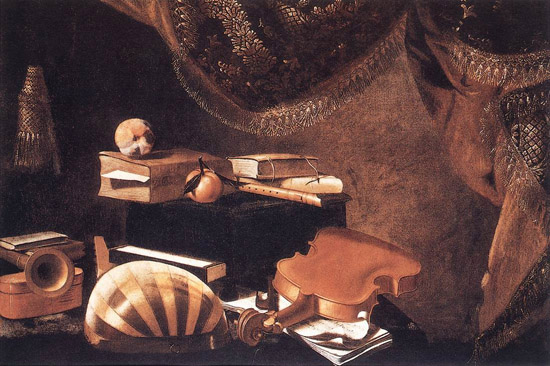Schutz was born in Kostritz in modern-day Germany and received
a musical education. First a choirboy, he went in 1609 to study
with Giovanni Gabneli in Venice, where he was exposed to Italian
musical influences. He moved to Dresden in spring 1617, married
the daughter of a court official, and rose in influence as the
director of the leading musical centre of Protestant Germany,
under the patronage of Johann Georg I, Elector of Saxony.
April 1627 was spent at the Elector's castle at Hartenfels
celebrating the marriage of the Elector's daughter. On 12 April,
Schutz premiered his pastoral tragicomedy Daphne. The score
has not survived but Daphne is considered the first German
opera and initiated a great tradition in Germany. After the
marriage, Schutz visited Italy and spent time with Monteverdi in
Venice.
In 1635 Prince Heinnch of Reuss, Schutz's patron and friend,
died. The Prince left precise details of the music he wanted for
his funeral, and Schutz responded by writing his largest and most
important funeral work, the Musicalische Excquien. The work
is in several sections and calls for various combinations of
soloists and choirs with a cello and harpsichord accompaniment.
The financial pressures caused by the Thirty Years' War led to
a serious depletion of the Dresden court's resources. Schutz was
therefore pleased to travel to Copenhagen when asked by the Crown
Prince of Denmark to arrange the music for his wedding m 1634. He
rose to become Kapellmeister, and after a similar post in Hanover
returned to Dresden in 1645.
Now approaching 60, Schutz sought retirement. This was denied,
but he was allowed to work only six months of each year for the
following decade. He sought full retirement on three further
occasions, complaining of the shameful state of the court
musicians, which failed to inspire him. Eventually, Elector Gcorg
died in 1656 and his replacement granted the release Schutz so
richly deserved. Schutz continued to compose during retirement,
concentrating as he had throughout his life on sacred music.
Christmas story, based on Gospel texts, was first performed m
1660; and around 1665 he wrote the St John Passion, one of
three Passions from late in Schutz's life, which in line with
liturgical practice in Dresden feature unaccompanied voices. It is
considered one of the pinnacles of the composer's work and
influenced Bach when he came to write his great Passion settings.
At the end of his life Schutz suffered from failing eyesight and
hearing, and in his eighty-fourth year he died following a stroke.
His compositions managed to amalgamate the ornate-ness of the
Italian Baroque with the more sober music traditions of Germany: a
grafting of styles that was a vital part of Schutz's great
contribution to German music.
|



No comments:
Post a Comment